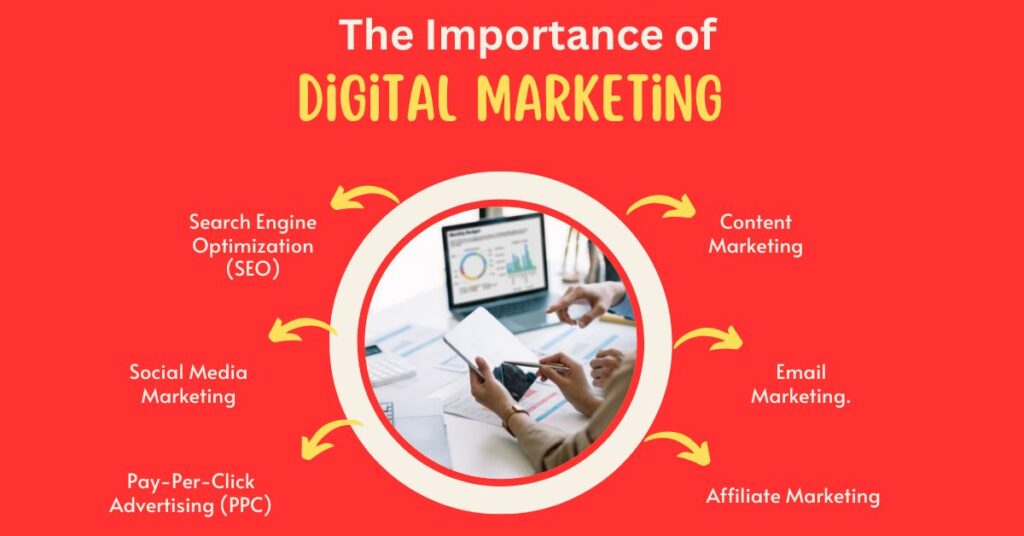Digital marketing has revolutionized how businesses connect with their audience. Whether you’re a startup, an established company, or an individual looking to build a brand, understanding digital marketing is essential for success in today’s digital-first world. In this guide, we’ll explore the fundamentals of digital marketing, dive into key strategies, and share actionable tips tailored to your specific needs.
What is Digital Marketing?
Digital marketing encompasses all marketing efforts that use the internet or electronic devices. It includes various tactics and strategies to promote products, services, or brands through digital channels. These channels include:
- Search engines (SEO and SEM)
- Social media platforms
- Email marketing
- Content marketing
- Affiliate marketing
- Online advertising
Why is Digital Marketing Important in 2025?
In the ever-evolving digital landscape, businesses must adapt to remain competitive. Here’s why digital marketing is crucial:
- Wider Reach: Unlike traditional marketing, digital marketing lets you reach a global audience.
- Cost-Effective: Digital campaigns are more affordable and yield better ROI than Traditional methods.
- Data-Driven Insights: Tools like Google Analytics help tracks performance and optimize strategies in real time.
- Targeted Marketing: Advanced targeting options ensure you reach the right audience with precision.
- Measurable Results: Every aspect of a campaign can be measured and analyzed for better outcomes.
Key Components of Digital Marketing
1. Search Engine Optimization (SEO)
SEO involves optimizing your website and content to rank higher on search engines like Google. The main goals are to increase visibility and attract organic traffic.
Actionable Tips for Better SEO:
- Conduct keyword research to identify relevant search terms.
- Create high-quality, engaging content.
- Optimize meta titles, descriptions, and headers.
- Use internal and external links effectively.
- Ensure your website is mobile-friendly and fast.
2. Social Media Marketing (SMM)
Social media platforms are powerful tools for building brand awareness and engaging with your audience.
Key Platforms:
- Facebook: Best for community building.
- Instagram: Perfect for visual storytelling.
- LinkedIn: Ideal for B2B marketing.
- Twitter: Great for real-time updates.
Engagement Strategies:
- Post consistently and at optimal times.
- Use a mix of content types (images, videos, polls).
- Engage with followers through comments and direct messages.
- Run targeted ads to boost visibility.
3. Content Marketing
Content marketing focuses on creating valuable and relevant content to attract and retain an audience.
Types of Content:
- Blog posts
- Infographics
- Ebooks
- Videos
Best Practices:
- Address the pain points of your target audience.
- Maintain a consistent posting schedule.
- Use storytelling to make content more relatable.
4. Pay-Per-Click Advertising (PPC)
PPC involves running paid ads on platforms like Google Ads, Facebook Ads, and LinkedIn Ads. It’s an effective way to drive traffic quickly.
Tips for Successful PPC Campaigns:
- Set a clear goal (e.g., leads, sales, website traffic).
- Use A/B testing to optimize ad creatives.
- Target the right keywords and demographics.
- Monitor performance metrics like CTR and conversion rate.
5. Email Marketing
Email marketing remains one of the most effective ways to nurture leads and build customer relationships.
Strategies for Effective Emails:
- Personalize your emails with names and tailored content.
- Use attention-grabbing subject lines.
- Include clear call-to-actions (CTAs).
- Segment your email list for targeted campaigns.
How to Create a Winning Digital Marketing Strategy
Step 1: Define Your Goals
Clearly outline what you want to achieve. For example:
- Increase website traffic by 50% in 3 months.
- Generate 100 qualified leads in a month.
Step 2: Know Your Audience
Understand your target audience’s preferences, pain points, and behavior. Use tools like Google Analytics and social media insights for data.
Step 3: Choose the Right Channels
Focus on platforms where your audience is most active. For example:
- Use LinkedIn for B2B marketing.
- Leverage Instagram for a younger demographic.
Step 4: Create High-Quality Content
Invest time in crafting engaging and value-driven content. Use tools like Canva for visuals and Grammarly for error-free writing.
Step 5: Measure and Optimize
Track KPIs such as:
- Website traffic
- Conversion rate
- ROI on ad spend
Use insights to refine your strategies for better results.
Trends Shaping Digital Marketing in 2025
- Artificial Intelligence (AI): AI tools are revolutionizing content creation, customer service, and data analysis.
- Voice Search Optimization: Optimize for voice search queries to stay ahead.
- Interactive Content: Quizzes, polls, and interactive videos boost engagement.
- Sustainability: Highlighting eco-friendly practices resonates with conscious consumers.
- Personalization: Tailored content and recommendations are key to winning customers.
Conclusion
Digital marketing is a powerful tool for achieving business growth. By understanding its core components, leveraging the right strategies, and staying adaptable to trends, you can create impactful campaigns that resonate with your audience. Start small, measure your results, and scale your efforts for maximum impact.
Are you ready to take your digital marketing to the next level? Begin your journey today and unlock endless opportunities!

